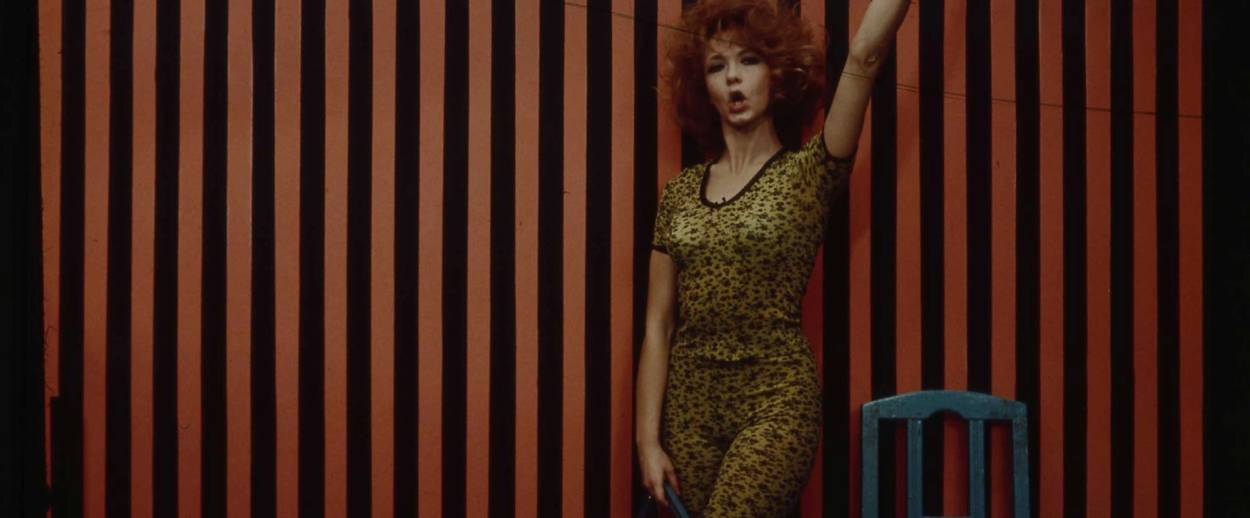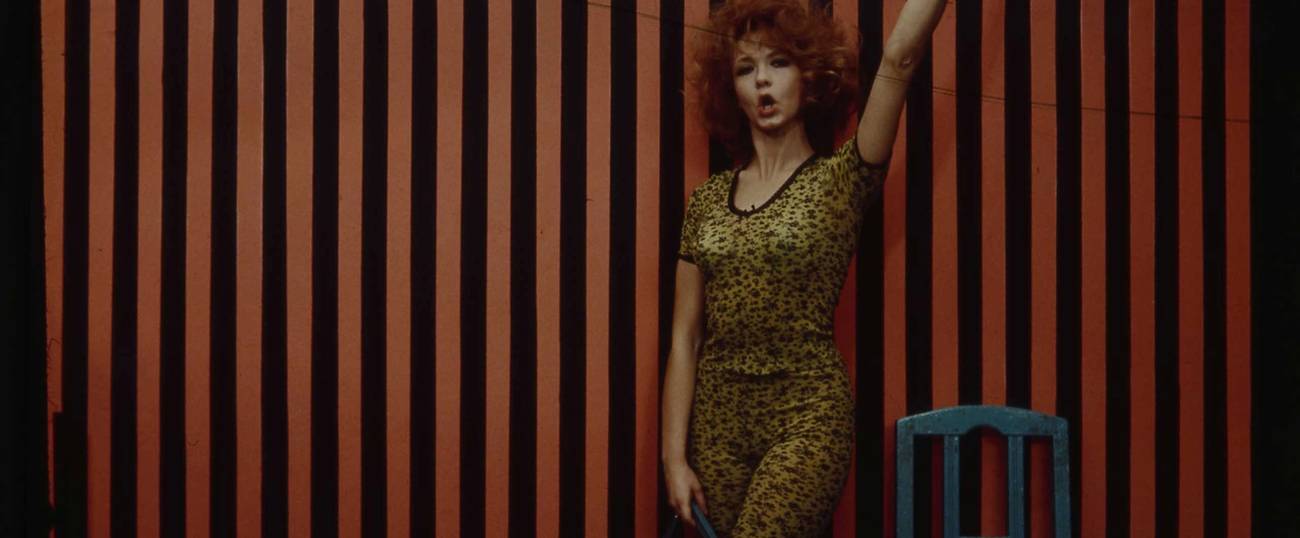The Rootless Cosmopolitan Who Mocked Totalitarian Consciousness
What the late Yugoslav filmmaker Dušan Makavejev contributed to Greenwich Village’s life-affirming anti-authoritarian counterculture




Three titans of the ’60s counterculture died within two weeks this past January: Jonas Mekas, the main force behind the New American Cinema, aka underground movies; Izzy Young, the original folkie and prime organizer of the Greenwich Village folk revival; and Dušan Makavejev, the taboo-busting Yugoslav filmmaker who made the quintessential counterculture film WR: Mysteries of the Organism.
All three men were exiles. Born in rural Lithuania, Mekas came to America from a German DP camp in 1948. Young, the child of Polish Jewish immigrants, left America for Sweden in 1973. That same year Makavejev was effectively banished from his native land for the sin of WR—a tribute to another outcast, the radical psychotherapist and original Freudian-Marxist, Wilhelm Reich.
Young was a Jew. To my mind, Mekas and especially Makavejev were in some sense Jew-ish, not least in that, exiled from their East European homelands, they necessarily became stateless. Indeed, Amos Vogel, himself a refugee from Hitler’s Europe, used the term “rootless cosmopolitan,” the Stalinist code phrase for Jew, to approvingly characterize Makavejev in a 1973 Film Comment piece on WR.
Mekas thrived in exile but Makavejev’s career, like Young’s, was front-loaded. His claim to greatness is staked on his three Yugoslav features, Man Is Not a Bird(1965), Love Affair, or the Case of the Missing Switchboard Operator (1967), and Innocence Unprotected (1968), plus WR—partially shot in the United States with a grant from the Ford Foundation—all completed before the director turned 40.
Makavejev hailed from a cinematic backwater. Born in Belgrade in 1932, he, like Mekas, was scarred by his experience of World War II. Makavejev was 9 when the Germans bombed and occupied Belgrade. He was 12 when the city was again bombed, this time by American and British planes. Small wonder that he would remember Edgar G. Ulmer’s prophetic anti-Nazi horror film The Black Cat as a movie that sent him hiding beneath his seat.
As a psychology student in Tito’s newly Communist (but anti-Stalinist) Yugoslavia, Makavejev developed an interest in Reich’s theory that fascism was a symptom of sexual repression—which was unusual, perhaps heretical, in his milieu, if not everywhere. In Unclean Lips: Obscenity, Jews, and American Culture, Josh Lambert notes that Reich who, already self-exiled from Nazi Germany, escaped Europe for a gig at the New School on the eve of WWII, had been “taken up vigorously by a number of the Jewish writers who were busy transforming American literature”: Saul Bellow, Allen Ginsberg, Paul Goodman, Norman Mailer, Isaac Rosenfeld, and J.D. Salinger.
In Makavejev’s case, Reich represented a form of life-affirming anti-authoritarianism, a spirit that would soon be apparent in his early documentaries, most famously a deadpan recording of preparations for an official May Day celebration. In a general sense, Makavejev was part of the movement within Yugoslav Communism toward a decentralized, democratic socialism associated with the journal Praxis, which asserted that a “free society” was only possible with the development of “free” personalities.
The same held true for Makavejev’s features. Both Man Is Not a Bird and Love Affair, or The Case of the Missing Switchboard Operator are fiction-documentary hybrids, at once satiric and tragic, preoccupied with the messiness of eros in a traditional, regulated society. Less overtly political but equally concerned with fantasy and repression, Makavejev’s third feature, Innocence Unprotected, was a documentary fashioned from the first Serbian talkie, a professional acrobat’s naive self-dramatization made under German occupation in 1942. Then came WR, a documentary shot in the United State interspersed with a fiction filmed in Yugoslavia—a demonstration per Makavejev that a “nonpoor third world power,” like his country, might take a leading role and “show the way ahead.”
To that end, Makavejev used footage of practicing Reichians (as well as scenes featuring Andy Warhol’s most subversive drag star, Jackie Curtis; Fug founder and beat poet Tuli Kupferberg; and the founders of Screw magazine) to annotate a fictional story that, not only highly comic, was also the most intense critique of the October Revolution ever made in a Communist country. In this self-consciously socialist realist travesty, characters discuss their personal relations in Marxist cliché: “As long as you were an apprentice beautician, you used to let me pluck roses in your garden. But now that you’ve passed a Party course, you snub intimate proletarian friend,” an irate Shockworker-of-Tito complains to the winsome, newly-minted Reichian militant Milena, who responds to his “slanderous lie” by labeling him an “irresponsible element.”
Makavejev’s crypto-dramatization of Reich’s Mass Psychology of Fascism mocks Communist intellectuals, Yugoslav workers, and the Stalin cult, while making delirious use of post-Soviet montage: The shrill harmonies of a Yugoslav hymn (“Oh Communist Party! My fragrant flower!”) are conjoined with a mock Reichian documentary of a couple making love; images of shock therapy are inserted into the 1946 socialist realist classic The Vow; Stalin’s proclamation “Comrades, we have successfully completed the first stage of Communism” is juxtaposed with a plaster cast of an erect penis, made by a pair of enthusiastic American groupies.
Love appears when Milena falls for a priggish Soviet “positive hero,” a champion ice skater and People’s Artist insolently named Vladimir Ilych who, encased in character armor, cannot accept her sexual importuning and lashes out at her with his skate. Milena loses her head, literally. In the movie’s final scene, she addresses us from a tray in a forensic lab, declaring that “Even now I am not ashamed of my communist past.” In effect, Makavejev provided his own epitaph.
***
WR had its world premiere at Cannes in 1971. “Somewhere along in every film festival there comes that one film that electrifies everyone, that sets everyone from the man on the street to the president of a major American company talking about it with the same passionate enthusiasm,” Cynthia Grenier told the readers of The New York Times the morning after WR’s midnight premiere before “a standing-room-only audience that cheered and screamed and applauded for a good quarter of an hour at 2 o’clock in the morning.”
Makavejev not only found a third way between East and West, he operated between the worlds of art-house and avant-garde cinema. Several months after WR opened commercially in New York, Jonas Mekas devoted three Village Voice columns to the movie, which, despite or perhaps because of its international fame, was never publicly screened in Yugoslavia.
In early 1973, Makavejev was expelled from Yugoslavia’s Communist party and after he gave an interview on the status of WR to a West German newspaper, was indicted on criminal charge of derision “of the state, its agencies and representatives” while Yugoslav film workers attempted to ban the movie’s foreign sales.
Unable to work in Yugoslavia, Makavejev made Sweet Movie (1974) in Canada with French and German funding, biting the hand that fed him by combining another attack on Soviet communism with an outrageously gross evocation of capitalist consumer frenzy. But WR proved to be an impossible act to follow. In Sweet Movie—a far less likeable scatological political allegory in which—awash in expelled bodily fluids and chocolate syrup, and featuring an extended performance by the Vienna performance artist Otto Muehl’s ultratransgressive Therapie-Komune—revolt was shown as revolting. By then, the counterculture was pretty much over. Izzy Young had relocated his Folklore Center from Bleecker Street to Stockholm and Jonas Mekas was purged from the newly mainstreamed Village Voice.
Makavajev never recovered from the disaster of Sweet Movie. Offers dried up, although meeting Makavejev at the 1974 Telluride Film Festival, Francis Ford Coppola proposed that he direct Apocalypse Now. Makavejev corresponded with fellow scandal-survivor Philip Roth, and was at one point slated to direct a Swedish adaptation of Roth’s 1977 novel The Professor of Desire (appropriately, the first of Roth’s East European fictions). Announced in late 1979, the movie went unmade. Instead, Makavejev directed another film in Sweden, the relatively gentle sex comedy Montenegro (1981), in which a neurotic housewife (Susan Anspach, who played a similar role opposite George Segal in Paul Mazursky’s 1973 Blume in Love) falls in with a carousing band of Yugoslav guest workers.
Initially, Makavejev planned to dedicate Montenegro to “the new invisible nations of Europe … 11 million immigrants and guest workers who moved north to exploit rich and prosperous people, bring with them filthy habits, bad manners, and the smell of garlic.” Indeed, the movie’s best scenes are set amid the Balkan partying of a back-alley nightclub, the Zanzi Bar. After seven years in the wilderness, Montenegro marked Makavejev’s return to Cannes, where Israel—one of the few countries in the world where Sweet Movie was well-received—quickly acquired distribution rights.
In December 1981, Makavejev came to Israel to scout locations for a project described as a comedy predicated on the conflict between the observant and the secular. Nothing came of that, but some years later, the Israeli mini-moguls Menahem Globus and Yoram Golan produced Makavejev’s penultimate feature, Manifesto, a period farce about pre-WWI revolutionaries shot in Yugoslavia. Although sneaked at the market screening in Cannes, Manifesto had its official world premiere at the 1988 Jerusalem Film Festival which is where I met Makavejev. He told me that as fractious, multi-ethnic, and exuberantly Mediterranean as Israel was, it reminded him of home.
Gorilla Bathes at Noon, Makavejev’s last feature, was shot in post-Cold War Berlin. An affably episodic travelogue following the adventures of the city’s last Soviet soldier, it allowed the filmmaker to dust off some old tricks—diapering a baby with an East German flag, parodying the most famous of Soviet statues by relocating its forward-striding, hammer-and-sickle-brandishing couple to an automobile graveyard, overdubbing the Stalinist superproduction The Fall of Berlin with excerpts from Triumph of the Will. But it was also tinged with melancholy nostalgia.
When Makavejev returned to Yugoslavia in time to witness its death agonies, he found himself to be a man without a country. Serbian nationalists denounced him as a Jew for his call for NATO airstrikes against Serbian positions during the siege of Sarajevo. Back in 1973, Makavejev had told Mekas he was surprised by the “immense hatred,” WR provoked even in America, adding, “My film is a cinematic test for a totalitarian consciousness.” So was his life.
***
Read J. Hoberman’s film and art criticism for Tablet magazine here.
J. Hoberman was the longtime Village Voice film critic. He is the author, co-author, or editor of 12 books, including Bridge of Light: Yiddish Film Between Two Worlds and, with Jeffrey Shandler, Entertaining America: Jews, Movies, and Broadcasting.